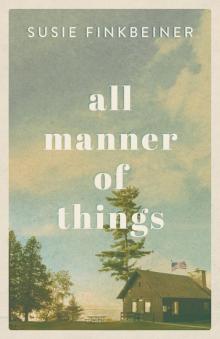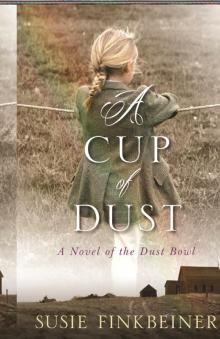- Home
- Susie Finkbeiner
All Manner of Things
All Manner of Things Read online
“Some books are meant to be read. All Manner of Things is meant to be lived in. The pages enfolded me into a raw and beautiful family journey that touched me on a soul level. This exquisitely rendered portrait of hope, courage, and love in a time of war is a triumph and a gift. Susie Finkbeiner at her finest.”
Jocelyn Green, Christy Award winning author of Between Two Shores
“Susie Finkbeiner has created characters so real in All Manner of Things, you may want to write them a letter to find out how they are doing once you’ve turned the last page of the book. You’ll cheer them on in the good times, weep with them during the hard times, and be glad you got to live their story with them. Definitely a story and characters you will remember.”
Ann H. Gabhart, bestselling author of River to Redemption
“All Manner of Things should be at the top of everyone’s reading stacks. Readers will love Finkbeiner’s graceful prose about an overlooked but important era. With intimacy, a poetic voice, and an ever-present grip on hope, Finkbeiner writes with breathtaking admiration for the common American family in the throes of unbearable circumstances. Beautiful. Honest. Artfully written. A winning novel.”
Elizabeth Byler Younts, author of The Solace of Water
© 2019 by Susie Finkbeiner
Published by Revell
a division of Baker Publishing Group
PO Box 6287, Grand Rapids, MI 49516-6287
www.revellbooks.com
Ebook edition created 2019
All rights reserved. No part of this publication may be reproduced, stored in a retrieval system, or transmitted in any form or by any means—for example, electronic, photocopy, recording—without the prior written permission of the publisher. The only exception is brief quotations in printed reviews.
Library of Congress Cataloging-in-Publication Data is on file at the Library of Congress, Washington, DC.
ISBN 978-1-4934-1792-6
This book is a work of fiction. Names, characters, places, and incidents are the product of the author’s imagination or are used fictitiously. Any resemblance to actual events, locales, or persons, living or dead, is coincidental.
For my parents
Contents
Cover
Endorsements
Half Title Page
Title Page
Copyright Page
Dedication
Epigraph
Prologue
1
2
3
4
5
6
7
8
9
10
11
12
13
14
15
16
17
18
19
20
21
22
23
24
25
26
27
28
29
30
31
32
33
34
35
36
37
38
39
40
41
42
43
44
45
46
47
48
49
50
51
52
53
54
55
56
57
58
59
60
61
62
63
64
65
66
67
68
Epilogue
Author’s Note and Acknowledgments
About the Author
Back Ads
Back Cover
All shall be well, and all shall be well, and all manner of things shall be well.
—Julian of Norwich
Prologue
SUMMER, 1955
We sat at the end of the dock, my father and me. Early morning fog hovered over Chippewa Lake, so thick I couldn’t see to the other side. As far as I could tell we were the only two awake out of all the people in Fort Colson. It wouldn’t have surprised me to learn that we were the first up in the whole state of Michigan.
My father was having a good day, I’d known from the moment I came out of my bedroom. For one, he smiled as soon as he saw me. For two, he asked if I wanted to sit on the dock with him. Last, he’d poured two cups of coffee, his black and mine mostly milk and sugar.
“Don’t tell your mother,” he’d whispered, his voice soft and deep, his dark eyes full of mischief. “Promise? She wouldn’t approve of a six-year-old drinking coffee. She’ll worry that it’ll stunt your growth.”
“Will it?” I had asked, pushing my cat-eye glasses up the bridge of my nose.
“I guess we’ll see.”
Loose shoulders, easy smile, teasing words, sparkle in the corner of his eyes. He was having a good day, all right.
Good days didn’t come along very often for him, not since Korea.
Melancholy was what my mother called it. When I asked her what that word meant, she told me it was a longer word for sad. When I asked why my father was sad, she told me that war made people that way. When I asked her how war did that, she told me I’d understand when I got older.
It little mattered that morning, though. I was beside my father, sitting Indian style on the dock and listening to the loons call to each other. Their trilling and yodeling filled the air, echoing off the trees that lined the shores of the lake.
“You know what she’s saying?” my father asked.
I shook my head.
“She’s calling out to another loon. Maybe her mate, maybe her chick. Either way, the other has strayed off and she’s searching for him.” He sipped his coffee. “She says, ‘Hey, where are you?’ Then the other one answers, ‘Don’t worry. I’m right over here.’”
“Then they find each other?”
He nodded, looking out into the first-of-the-morning fog.
“Dad?” I whispered.
“Annie.”
“What if the lost one doesn’t call back?”
He hesitated, nodding his head and pushing his lips together the way he did when he was thinking.
“Well, I suppose the first one yodels out louder, ‘You get back here, you loon!’”
I laughed and he smiled and I thought I saw a glimpse of how I imagined he’d been before the war. I’d been too small then. I couldn’t remember.
We sat in the quiet a few minutes longer, the loons still calling back and forth through the fog that thinned as the sun brightened, burning it away. We drank our coffees, the bitterness of mine cutting through the milk and sugar just enough so I’d know it was there.
That night, while the rest of us slept, my father packed a few of his things and drove away in his Chevy pickup truck. I waited for him the rest of that week, sitting alone on the dock with my feet dangling over the edge, toes disturbing the stillness of the water. He hadn’t left a note, and I was sure he’d come back any minute. I wanted to be there when he did.
The next Wednesday his letter came with no return address.
Gloria, I can’t be who you need me to be, it read. I have to see if I can walk off the war. Tell the kids I’m sorry. —Frank
After that I stopped waiting for him. We all did. It was easier that way.
1
JUNE, 1967
When God created the world, he only afforded Michigan just so many good-weather days. He caused the bookends of the year to be winter and the months between to be
warm enough for the earth to almost thaw before it was to freeze solid once again.
And somehow, in his infinite wisdom he had chosen to call it good.
In the deepest of winter, I often questioned the soundness of mind that made my ancestors think that Michigan was a good and fine place to settle. But it was in spring, when the whole world came back alive and I forgot the cold, that I swore to never leave my home state. Leaves turned the forests back to green, and flowers speckled bright red and yellow and orange across the lawns and fields. Purple lilacs bloomed on the bush below my bedroom window, smelling like heaven itself. Finches molted tawny feathers to show off their brilliant goldenrod. Robins returned with their trilling song, and just-hatched chicks peeped from their nests, discarding pretty blue shells on the ground.
Every year it caught me by surprise, the return of life to Fort Colson. But by June I’d fallen into the routine of longer days and leaving my jacket at home, letting the sun warm my bare arms.
I certainly would have liked to enjoy the sunshine. Instead, I stood looking out the big window of Bernie’s Diner, dripping washrag in hand, wishing the view was of something other than the five-and-dime across the street. It was the perfect day for sitting on a dock, dipping my toes into the waters of Chippewa Lake.
Old Chip. That was what my brothers and I called it. Where we all learned how to swim and row a canoe and catch fish. Growing up without Frank around hadn’t been a walk in the park. But having a mother who was unafraid of getting muddy and hooking a worm on the line made it a little bit easier. Especially for my brothers.
The sound of clattering pots or pans from the kitchen snapped my attention back to my job. I wrung the extra water from my rag and scrubbed down the tabletops, wiping away the breakfast crumbs to make way for the lunch plates. A couple of girls I knew from high school walked along the sidewalk past the diner window, wearing minidresses and bug-eyed sunglasses that seemed all the rage that year.
Using my knuckle, I pushed up my plastic-framed glasses and hoped they wouldn’t notice me. Bernie’s dress code only allowed white button-up shirts and slacks—no jeans. On my own I was a certifiable L7 square. The uniform didn’t help matters at all.
The girls looked in through the window. Sally Gaines with the perfectly coiffed auburn bouffant and Caroline Mann with her diamond engagement ring sparkling in the sunshine. Sally’s mouth broke into an impossibly perfect smile and she waved, her fingers wiggling next to her face.
I knew that it was not meant for me. As far as girls like Sally and Caroline were concerned, I was less than invisible. I didn’t even exist.
Turning, I saw my brother behind the counter, lowering a crate of freshly washed glasses to rest beside the Coca-Cola fountain. The glasses clinked together, but delicately, sounding just a little bit like chimes.
“You have an admirer,” I said, stepping away from the window.
“Great,” he said, thick sarcasm in his voice. Not looking up at the girls, he took one of the glasses and put it under the fountain, pulling half a glass of pop for himself. “They’re good tippers at least.”
“For you.” I watched him take a few drinks of the Coke before moving on to setting the tables with silverware wrapped in paper napkins. “I don’t have the advantage of flirting with them.”
“You’ve got a point,” he said. “I am charming.”
“And I’m a nerd.”
“Nah, you’re peachy keen.”
“Well, thanks.” I looked back to where the girls had stood. They were already gone.
“I have my meeting today,” Mike said, finishing off the last of his pop. “The one I told you about.”
“When?”
“After lunch. Bernie told me I could leave a little early.”
“Did you tell him what it’s about?”
“No.” Mike put his empty glass on the counter. He lowered his voice to just above a whisper. “I kind of gave him the impression that it’s a doctor’s appointment.”
“And he bought it?” I asked. “You know you’re the worst liar in the world, don’t you?”
“He didn’t seem to doubt me.” He poured himself another half glass of pop and drank it all at once. “I didn’t want him trying to talk me out of it.”
“Do you really have to do this?” I asked.
“Yeah,” he answered, covering a silent burp with his fist. “Unless you have any other ideas.”
“Canada’s only a few hours away.”
He raised his eyebrows and made a humming sound. “I’m not sure that’s a great option.”
“What did Mom say?”
Shrugging, he walked around the counter, checking the ketchup bottles from the tables to see which needed refilling. He carried the half-full ones back to the counter in the crook of his arm.
“You told her, didn’t you?” I asked. “Please tell me you did.”
“Not exactly.” He lined the bottles up on the counter.
“What do you mean by ‘not exactly’?”
He cringed. “Not at all.”
“Golly, Mike,” I said, hoping it didn’t sound too much like a scold. “You should have asked her about it. She might have had some ideas.”
“I’m almost twenty, Annie. I’m an adult,” he said, making his voice deeper. “It doesn’t matter anyway. They’re sending me whether I like it or not. I might as well just volunteer and at least have some say over things.”
“I guess.”
“She’s going to be furious, though. I know she will be.” He moved behind the counter again and wiped the bottles down with a wet rag. “I don’t know how I’ll tell Joel.”
In the thirteen years since our baby brother was born, Joel loved no one as much as he did Mike. If he ever tired of such undying admiration, Mike rarely let on. He took to the role of big brother near perfectly.
“Why haven’t you told him?” I asked.
“Gee, I don’t know,” Mike answered, uncapping the ketchup bottles. “I tried. I just didn’t have the heart.”
“You aren’t abandoning him, if that’s what you’re worried about.”
“Maybe that’s it.”
“Still, you have to tell them sometime.”
“I will,” he said. “Don’t worry.”
“The sooner the better,” I said.
“I’ll know more about what’s going to happen after my meeting with the recruiter.” He sighed. “It’s a pickle, that’s for sure.”
“Maybe they won’t want you.”
“Come on, buddy, you’re going to hurt my feelings.”
“Oh, get out of here.”
“Soon enough, sis.” He turned toward the kitchen. “Soon enough I’ll get out of here all the way to Vietnam.”
If there was any consolation to be had for missing out on summer, it was that Bernie let me read during the lulls of the day, provided I had all my silverware wrapped and tables clean. I’d just settled onto the stool behind the cash register with book in hand when the bell over the door jingled with the arrival of someone. Regretfully, I shut the book and put it back on the counter. Scout Finch would just have to wait a little bit longer.
My mother stood just inside the door, purse hanging from her bent arm, and looking every bit the lady in her red blouse and tweed skirt. She’d worn her hair down that day with the ends in upturned curls.
She’d never been one to lie about her age. In fact, I’d heard her more than once brag about being over forty. “Just over,” she’d say. The conversation inevitably turned to how she looked so young.
“My secret?” she’d say with a conspiratorial wink. “A hairdresser who can keep my secrets and a strong girdle.”
My mother, Gloria Jacobson, ever the charmer who turned heads anywhere she went. And me, her beanpole of a daughter who hardly took the time to twist a braid into her hair most mornings. It was a wonder she never tried to give me beauty tips, as much as I sorely needed them. Then again, I’d never asked. Never much cared to, either.
“I
can’t stay long,” Mom said, making her way to the counter. “I have a few other errands to run before going back to work.”
“Late lunch?” I asked, checking my watch.
She rolled her eyes. “Mrs. Channing was in for a checkup today, and you know how she can go on.”
She lifted her hand, making a puppet out of her fingers, opening and closing them like a mouth.
“Did she ask again about you and the doctor?”
Mom sighed. “Of course she did.”
After Frank left us, Mom found herself in need of a job for the first time in her life. She’d put on her most professional-looking dress and walked over to Dr. Bill DeVries’s office to ask him to hire her. She’d said he owed her. For what, I’d never had the courage to ask. The doctor, though, just happened to have a position open at his office. She’d worked as his receptionist ever since.
If rumor could be believed, the good doctor had held a torch for my mother since they were young. He’d even invited her to prom, but a day late. She’d already accepted Frank’s invitation.
Most of the women in town waited for a romance to bud between Mom and Dr. DeVries. They’d waited more than twelve years with no sign of giving up hope. I wasn’t sure if theirs was an act of sheer determination or utter stubbornness.
Either way, Mom could outlast anyone, even the old biddies of Fort Colson.
“I told her that I’m still married and, as far as I know, that won’t change any time soon,” Mom said, instinctively touching the gold wedding band on her left ring finger.
When I’d asked her years before why she still wore it, she told me it was to “discourage any interested parties.” I wondered if it was also to keep certain chatterbox busybodies from speculation.
A small town like Fort Colson was fertile soil for gossip to take seed.
“Is Bernie here?” Mom asked.
“He’s in the office,” I answered. “It’s bookkeeping day.”
She reached into her purse, searching for something. “I’m sure it’s putting him in a foul mood.”
“Well, no more than usual,” I whispered.
“He’s not being grumpy to you, is he?” She arched one of her eyebrows. “You don’t have to put up with his moods, you know.”
“He’s my boss.”
“And he’s my cousin.”

 All Manner of Things
All Manner of Things The Nature of Small Birds
The Nature of Small Birds Paint Chips
Paint Chips My Mother's Chamomile
My Mother's Chamomile A Cup of Dust
A Cup of Dust